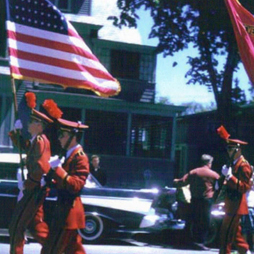
The Boy Carrying the Flag
Collected in: The Ghosts of You and Me
Once, as the teenage boy marched up
and down the gutter with the wide blade
of a shovel above his head, and the goats
turned toward him in their stalls
undoing with their blats the band
music he held in his mind,
his stepfather, who had only asked,
for Christ’s sake, to have the barn
cleaned out, rested his hand
on his hip in the doorway.
The boy would not have guessed
when he marched in his first parade
that he carried the flag for his stepfather,
or for his angry mother, also raised
for work and self-denial
during the Depression. Seeing him
dressed up like that to leave her stuck
on a failing farm with chores
as she had been stuck when she was just
his age, his mother remembered he forgot
to feed the chickens and refused
to drive him to the football game.
The old barns and dead cornfields
along the road in the sunless cold
had never seen a hitch-hiker in red
wearing spats and lifting a white-
gloved thumb. Everyone stared
from the cars that passed him by,
and when at last he jumped down
from the door of a semi, the whole
marching band waiting in formation
by the buckling steps of the school
and Mr. Paskevitch, whose hands
twitched worse than ever, watched him
walk across the lawn looking
down at his size-fourteen black shoes.
Just one year from now, Paskevitch
would suffer a nervous breakdown
he would never return from,
but today, he raised the baton
to begin the only thing on earth
that could steady his hands, and the boy,
taller than the others, took his position
in the color guard to carry the flag
for Paskevitch, and for the sergeant-
at-arms, Pete LaRoche, so upset
by the hold-up he was screaming
his commands. For this first parade
belonged to LaRoche, too, and to O’Neill,
another son of immigrants, hoisting
the school colors, and to the rifle-bearers,
Wirkkala and Turco, the fat kid
who squinted helplessly against the wind.
Marching with a shuffle, Turco was already
resigned to his life in the shoe shop,
but this was before he went to work
on the night shift and drank all day,
and before Ann Riley, the head majorette
following the boy past the stopped
traffic kicking up her lovely legs,
got pregnant by the quarterback
and was forced to drop out
of the senior class. In this moment
of possibility in the unforgiving 1950s,
she wore nobody’s ring around
her neck, and the boy imagined
how easily she had forgiven him
his lateness, and the times his mind
wandered and he fell out of step.
For in his secret heart he carried
the flag for Ann as he marched onto
the football field, leaving the town
with its three factories and wasted
farms far behind. There were La Roche’s
and O’Neill’s mothers, on their day off
from the flock mill, and there
were the fathers in their shop-pants,
and the classmates in school jackets,
and the teachers who looked strange
without their ties, all applauding
and shouting while the band, capped,
plumed, and lifting up the shining bells
of their instruments, marched by –
all here on this dark and windy day
to watch the quarterback, Joe Costello,
Ann’s lover-to-be, lead them into the sun,
as were the band and the tallest boy
in the color guard himself,
carrying the stars and stripes
for everyone who was here
and not here in this broken town,
and for the hope in the uncertain
promise that struggled
against his hand as he marched
to his place in the bleachers
among these, his fellow Americans.